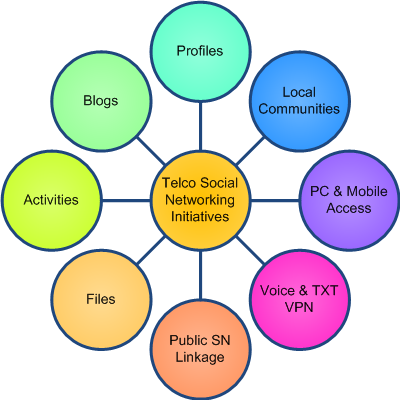Originally posted on 31Dec09 to IBM Developerworks where it got 10,998 Views
As I see it, Telcos (particularly in counties that I deal with) are in a perfect position to transform their subscriber’s enthusiasm for social networking into real business benefits
Combining traditional Calling Circle Applications (aka Family & Friends, or VPNs as the Telcos would call them) with online (PC or Mobile) communities to share information. These could be short-lived around:

- Religious event
- Public Holiday
- Sporting finals
- Wedding Anniversary
- 21st Birthday Party
Or they could be longer term communities such as :
- Kindergartens
- Scout Troups
- Football Clubs
- Fan clubs
- Church Groups
- Service Clubs (Lions, Apex, Rotary etc)
These are just some that come to mind off the top of my head. I am picturing discounted call and text rates for community members as well as discounted data rates for mobile access to the web community including blogs, activities, profiles, discussions etc. Think about these sort of integrated scenarios for Telcos:
- Sending SMS messages to blog subscribers every time that blogger posts a new blog
- Emails or SMS message to a community – based on either their profile or their current location.
- Microblogging aggregation – the subscriber sends a SMS to a shortcode, which then updates all the other microblogging services that subscriber uses (Facebook, Twitter, MySpace, Freindster etc)
- Write blog posts on your mobile phone either via a MMS message (including images, video or audio), the phone web interface, an email interface or (for shorter entries) SMS messages.
- Bloggers could recieve SMS messages whenever someone comments on their posts
- …. the list goes on…
In these days where churn is a significant issue for most Telcos – especially in countries where mobile number portability (MNP) has been introduced, anything a telco can do to make themselves more sticky for their subscribers is a good thing. Also add to that the potential additional revenue from additional data and messaging usage and we have a proposition that lot of telcos would be interested in. I wouldn’t see this as having a major effect on ARPU, but every little bit helps.
I can picture a wide range of services that telcos could combine with their Social networking offerings that would draw out additional revenue from their subscribers. While there are plenty of Internet based companies offering blogging, file sharing, profiles, microblogging etc, none of them have the established relationship that a Telco has with it’s subscriber base. Additional, very few of them have a local presence outside of their home country. Telcos are localised in nature – either through government heritage, Government regulation, Language or social reasons – Telcos need to take advantage of that fact. OK, their in country competitors have the same advantage, but in this race, the real competitors are the Internet providers. Obviously, a Telco that can move on this territory before their local competition will have a significant advantage in the marketplace.
My gut tells me that within each country, we are just waiting for the first Telco to offer these sort of converged services before all the others in that marketplace decide that they need to as well – the Domino effect.
Speaking about the Domino effect, I am struck by the irony of the naming of that principle and what is happening in the Vietnam telco market right now. The US Government coined the term the Domino effect to justify entering the Vietnam War in support of South Vietnam (to prevent the fall of the rest of South East Asia to communism), yet in the Telecom industry in Vietnam, we are seeing a Domino effect with respect to Service Delivery Platforms right now – one telco goes down the SDP path, so now they are all going down the SDP path…
Now that I have rambled onto the subject of SDPs, a telco could offer Social Networking services without having a SDP in place, but in order to offer true integration between the Social Networking offering and the traditional telco services, a SDP will be required unless they want to go down the custom code path and I think we all know where that ends up – Spaghetti Junction!
